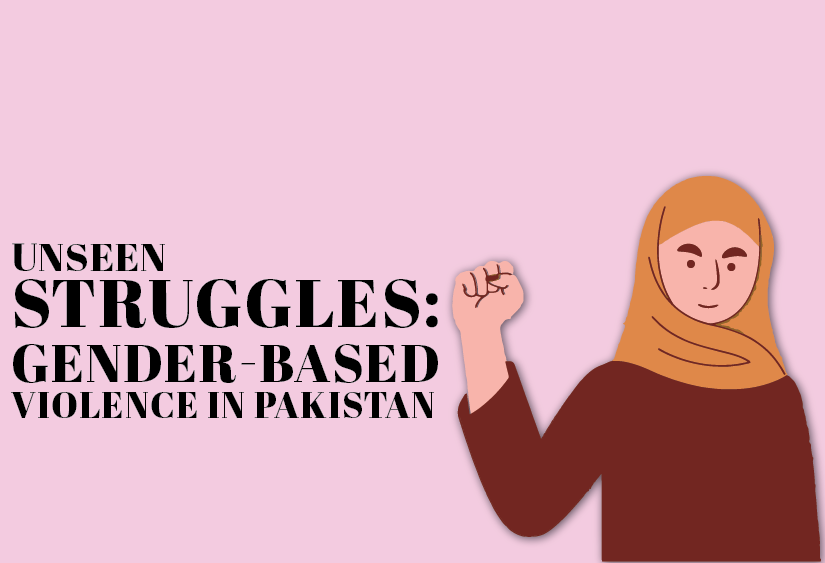
Article by
The recent gang-rape incident in Hafizabad, Punjab, where a woman was brutally assaulted in front of her husband and three-year-old daughter, is a harrowing reminder of our society's collective failure to safeguard women from the depravity of ruthless individuals. The incident serves as a blunt wake-up call, highlighting the urgent need for intensive efforts to ensure women's safety and security in our society.
Recently a famous TV anchor Ayesha Jehanzaib was severely beaten by her husband. Syeda Sania Zahra from Multan, brutally murdered by her husband in her own home. She sustained severe injuries including a severed tongue and broken teeth. In accordance with the National Commission for Human Rights (NHCR) 47% of Pakistani women endure domestic violence.
Every year, thousands of women and girls in Pakistan suffer sexual abuse and violence, yet only a small percentage of these cases are reported. More than 40 separate cases of abduction and sexual violence against women were reported in Punjab’s Mandi Bahauddin district alone in July (Dawn). This is largely due to the societal shame and fear of judgment that surrounds victims of sexual assault, as well as a widespread lack of trust in the country's criminal justice system to effectively indict culprits and deliver justice. As a result, many cases go unreported, leaving victims without support or recourse, and allowing committers to go unpunished.
Gender-based violence (GBV) is inescapable and devastating issue in Pakistan, where women and girls are subjected to a range of heinous crimes, including domestic violence, honor killings, forced marriages, acid attacks, rape and sexual assault, female infanticide, and trafficking and forced prostitution.
According to a report released by the Sustainable Social Development Organization, in 2023, the report stated that on average, 28 women faced some form of violence every day in Punjab in 2023. Up to 6,624 rape cases were registered in 2023, meaning that one woman was raped every 45 minutes. Faisalabad topped the list and Lahore and Sargodha followed. Up to 626 women were kidnapped, 120 were killed in the name of honor, and 20 were trafficked in 2023. Lahore, Faisalabad, and Rahim Yar Khan were among the hot spot districts for these crimes. This was a 14.5% increase from the cases reported in 2022.
These forms of violence are often continued with exemption, fueled by deeply ingrained patriarchal norms, societal attitudes, and inadequate legal frameworks.
The consequences are severe, with survivors often suffering physical and emotional trauma, stigma, and even death. Sobia Shah in Larkana was brutely tortured by her father and paternal uncles because she filed a case against her husband. Her father and uncles convinced her to take the case back. When they failed to convince her, they tortured her throughout the night and amputated her legs. Unfortunately, women who seek separation or divorce also suffer at the hand of the brutes who claim to be their protectors.
It is essential to acknowledge the gravity of GBV in Pakistan and work collectively to address its root causes, strengthen laws and enforcement, and provide support services for survivors to create a safer and more rational society for all.
Addressing GBV in Pakistan requires a comprehensive approach that confronts the primary factors and works to create a more equitable and just society.
Firstly, and most importantly, providing support services for survivors is necessary to ensure they receive comprehensive care, including counseling, medical and legal aid, shelter, and economic support. Secondly, strengthening laws and enforcement is vital to ensure culprits are held accountable and survivors receive justice. Thirdly, empowering women and girls is essential to reducing their vulnerability to GBV. This involves increasing access to education, skills training, and economic opportunities, as well as promoting women's participation in decision-making processes. Furthermore, collaborating with community leaders, religious scholars, and influencers to promote gender equality and organize community-based initiatives. Lastly, promoting education and awareness is key to challenging harmful norms and behaviors.
“The beginning is the most important part of the work”
-Plato
So by taking this initiative and addressing GBV through these interconnected strategies, Pakistan can create a safer, more equitable society for women and girls.
 Monthly "Azeem English Magazine", launched in 2000, records the information about diverse fields like mental health, literature, research, science, and art. The magazine's objective is to impart social, cultural, and literary values to society.
Monthly "Azeem English Magazine", launched in 2000, records the information about diverse fields like mental health, literature, research, science, and art. The magazine's objective is to impart social, cultural, and literary values to society.
+92 51 88 93 092
First Floor, RAS Arcade, Eidhi Market, Street#124, G-13/4, Islamabad, Pakistan, 44000.